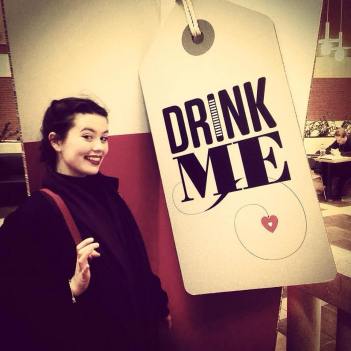Emily May, 18th January 2016
The Alice in Wonderland Exhibition was a charming way to fill an afternoon. Being free, and being based at the central location of The British Library (a impressive venue despite lacking the grandeur of other London museums) granted it the status of an easy pit stop for Londoners whilst on route to larger scale activities.

The “main event” was preluded by a series of card/wood-board constructions of infamous objects from the much loved story (such as the oversized bottle marked “drink me” pictured above) accompanied by an abbreviated retelling of the adventures in Wonderland, instantly building anticipation for Alice lovers young and old.
The exhibition itself was located behind this ensemble of images and popular quotations, and contained an array of original manuscripts, hand drawn illustrations and alternate editions of the children’s classic. Although impressive, the awe these objects held was more in their history than their actual visual appeal, due to being encased behind glass and restricted to being opened at a preselected page. It was also difficult to enjoy observing such artefacts due to the cramped nature of the display cases, especially when considering the amount of people who attempted to fit into the restricted space. Perhaps The British Library had underestimated the interest the exhibition would generate, which seems ironic due to the fact it was in celebration of the novel’s enduring popularity.

The Cheshire Cat by Joseph McHugh (1967)
One of the most intriguing parts of the exhibition was dedicated to exploring how Alice’s adventures have permeated throughout history and into contemporary culture – being a subject for the work of Surrealist painters- such as Dali – 1960s psychedelic posters, and even current computer games.
Overall, Alice in Wonderland at the British Library was a rewarding experience, particularly when it is considered it was open to the public without cost. The primary result of attending was a renewed fascination with the visionary fairytale, ignited inspiration to decipher all the cleverly constructed metaphors Caroll created, and realisations of how particular sections of the story are not as surreal as they may appear, and are in fact reflections of the reality of the human soul.

Although the exhibition closed on Sunday, Alice fanatics can still visit the Alice pop-up shop in the British Library until 31st January.
For more information visit: http://www.bl.uk/events/alice-in-wonderland-exhibition





